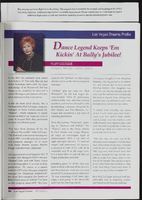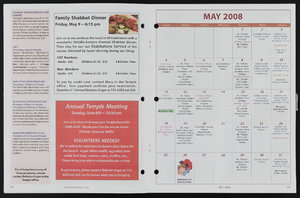Search the Special Collections and Archives Portal
Search Results
Mario C. Monaco oral history interview
Identifier
Abstract
Oral history interview with Mario C. Monaco conducted by Kim Rhodes on March 12, 1981 for the Ralph Roske Oral History Project on Early Las Vegas. In this interview, Monaco discusses moving from Montana to Las Vegas, Nevada in 1958. Monaco discusses his career in the U.S. Navy as well as his career in education. He also discusses changes in the education system, including the required competency test and changes in attendance policy.
Archival Collection

Fernando Romero oral history interview: transcript
Date
Archival Collection
Description
Oral history interview with Fernando Romero conducted by Laurents Bañuelos-Benitez on October 2, 2018 for the Latinx Voices of Southern Nevada Oral History Project. Barbara Tabach also participates in the questioning. Fernando Romero was born in El Paso, Texas in a musical home. His father and brother were avid music players, and his brother left El Paso to play in orchestra in Las Vegas. Despite not being as passionate about music as the rest of his family, music was Romero's ticket to higher education. Romero attended University of Nevada South before it was renamed University of Nevada Las Vegas. Romero has gone on to be deeply involved in the Las Vegas community. He is the current president of Hispanics in Politics. Subjects discussed in this interview include: Hispanics in Politics, Nevada Association of Latin Americans, and education.
Text
Ann McGinley oral history interview
Identifier
Abstract
Oral history interview with Ann McGinley conducted by Claytee White on August 01, 2006 for the UNLV @ 50 Oral History Project. McGinley discusses her careers working as a lawyer and teaching at several law schools before coming to teach at the Boyd Law School at the University of Nevada, Las Vegas in 1999.
Archival Collection
Daisy Lee Miller oral history interview
Identifier
Abstract
Oral history interview with Daisy Lee Miller conducted by Claytee D. White on March 22, 2013 for the African Americans in Las Vegas: a Collaborative Oral History Project. Miller discusses Las Vegas, Nevada’s education system and raising her children in the Westside community amidst the civil rights movement.
Archival Collection

Theresa Thomas interview, March 13, 1995: transcript
Date
Archival Collection
Description
Thomas discusses her early life in Thistle, Utah before moving to Las Vegas, Nevada in approximately 1931, where her father worked on the Hoover Dam (Boulder Dam) construction. Thomas then talks about her early schooling in Boulder City, Nevada, her experiences as a swing and dance band musician, Block 16 in the Clark Las Vegas Townsite, and her memories of Las Vegas hotels and casinos. Other subjects Thomas covers include Las Vegas entertainers, entertainment venues, and women in the music industry during the 1930s.
Text

Transcript of interview with Lori Chenin-Frankl by Barbara Tabach, June 7, 2016
Date
Archival Collection
Description
Lori provides a wonderful narrative of her Judaism, her love of teaching children and her devotion to family and music. She talks about growing up in Las Vegas and becoming a bat mitzvah, a rarity for girls in 1973. Throughout her life, including the period where she moved around with her Air Force husband, she sought Jewish connections to help her feel at home no matter where she was.
Text
Rainier Spencer oral history interview
Identifier
Abstract
Oral history interview with Rainier Spencer conducted by Sarah Buckner on April 27, 2015 for the African Americans in Las Vegas: a Collaborative Oral History Project. In this interview, Spencer discusses his personal history and arriving to Las Vegas, Nevada in 1997. He talks about his experience as a professor at the University of Nevada, Las Vegas (UNLV) and his involvement regarding diversity issues at UNLV. Spencer then discusses the novel
Archival Collection



